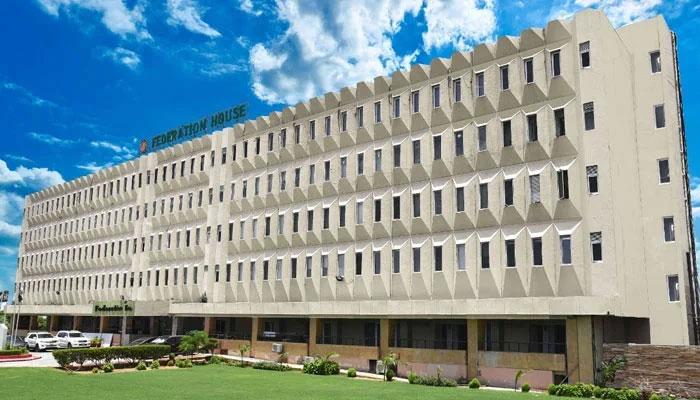Business leaders demand further rate cuts to support growth
KARACHI: The business community expressed a mixed reaction on Monday to the central bank’s recent 2.5 per cent policy rate cut, with industry leaders urging the State Bank of Pakistan (SBP) to further reduce the rate to single digits to better support businesses.
President of the Federation of Pakistan Chambers of Commerce & Industry (FPCCI) Atif Ikram Sheikh voiced disappointment, saying that the business community had hoped for a more substantial reduction. He noted that inflation, according to government data, currently stands at 7.2 per cent, and a single-digit policy rate would better align with the economic climate. “The business community expected a 500-basis-point cut to bring the rate down to 12 per cent, but the central bank only reduced it by 250 basis points (bps),” he said.
President of the Karachi Chamber of Commerce and Industry (KCCI) Muhammad Jawed Bilwani also commented on the SBP’s decision to lower the interest rate to 15 per cent. He highlighted that the KCCI had anticipated a more substantial reduction of at least 5.0 per cent, saying the current cut does not reflect the significant decline in inflation, which is now in single digits. “The key policy rate at 15 per cent remains too high. Ideally, it should be between 5.0 per cent and 7.0 per cent, aligning with other regional and global economies,” Bilwani stated.
He added that a lower interest rate would encourage borrowing, promote business expansion, and ultimately strengthen the economy. Although he appreciated the SBP’s move to continue easing monetary policy, which has seen the rate fall from 22 per cent to 15 per cent over four cuts, he urged for a more aggressive reduction to alleviate the financial strain on businesses and consumers.
Bilwani also pointed out that the SBP’s tight monetary policy had driven borrowing costs to levels that have particularly harmed the manufacturing sector. “We appreciate this fourth consecutive reduction and hope the SBP cuts the policy rate by at least 500 basis points in its next review,” he added.
President of the Korangi Association of Trade and Industry (KATI), Junaid Naqi, welcomed the 2.5 per cent cut, calling it a positive step but urging the SBP to consider further reductions to stimulate sustainable economic growth. He noted that the current high-interest rates have slowed economic activity and restricted industrial investment. Naqi added that a lower policy rate could revitalise the economy, while also cautioning against potential increases in imports, which could impact currency stability. He recommended government measures to curb imports to protect the rupee’s value, noting that while the rupee remains stable, an undervalued currency may hinder exporters. He advocated for a balanced approach that aligns currency value with economic fundamentals, growth goals, and foreign exchange reserves.
Naqi concluded by calling for a long-term policy approach that supports the rupee’s strength and a favourable interest rate environment, which he believes would bring lasting benefits to Pakistan’s industries, particularly exporters.
President of the Site Association of Industry Ahmed Azeem Alvi criticised the SBP’s 250bps reduction, deeming it insufficient. He called for the policy rate to be reduced to single digits and suggested that the monetary policy review should occur every 15 days. Alvi argued that as the economy is gaining stability, the SBP should hold a review meeting on November 25 to consider further rate cuts. He believes this would enhance business confidence and encourage long-term investment.Overall, while business leaders welcomed the SBP’s recent move, they are calling for deeper cuts to enable economic growth and reduce financial burdens on Pakistan’s industrial sectors.
-
 Nick Jonas Gets Candid About His Type 1 Diabetes Diagnosis
Nick Jonas Gets Candid About His Type 1 Diabetes Diagnosis -
 King Charles Sees Environmental Documentary As Defining Project Of His Reign
King Charles Sees Environmental Documentary As Defining Project Of His Reign -
 James Van Der Beek Asked Fans To Pay Attention To THIS Symptom Before His Death
James Van Der Beek Asked Fans To Pay Attention To THIS Symptom Before His Death -
 Portugal Joins European Wave Of Social Media Bans For Under-16s
Portugal Joins European Wave Of Social Media Bans For Under-16s -
 Margaret Qualley Recalls Early Days Of Acting Career: 'I Was Scared'
Margaret Qualley Recalls Early Days Of Acting Career: 'I Was Scared' -
 Sir Jackie Stewart’s Son Advocates For Dementia Patients
Sir Jackie Stewart’s Son Advocates For Dementia Patients -
 Google Docs Rolls Out Gemini Powered Audio Summaries
Google Docs Rolls Out Gemini Powered Audio Summaries -
 Breaking: 2 Dead Several Injured In South Carolina State University Shooting
Breaking: 2 Dead Several Injured In South Carolina State University Shooting -
 China Debuts World’s First AI-powered Earth Observation Satellite For Smart Cities
China Debuts World’s First AI-powered Earth Observation Satellite For Smart Cities -
 Royal Family Desperate To Push Andrew As Far Away As Possible: Expert
Royal Family Desperate To Push Andrew As Far Away As Possible: Expert -
 Cruz Beckham Releases New Romantic Track 'For Your Love'
Cruz Beckham Releases New Romantic Track 'For Your Love' -
 5 Celebrities You Didn't Know Have Experienced Depression
5 Celebrities You Didn't Know Have Experienced Depression -
 Trump Considers Scaling Back Trade Levies On Steel, Aluminium In Response To Rising Costs
Trump Considers Scaling Back Trade Levies On Steel, Aluminium In Response To Rising Costs -
 Claude AI Shutdown Simulation Sparks Fresh AI Safety Concerns
Claude AI Shutdown Simulation Sparks Fresh AI Safety Concerns -
 King Charles Vows Not To Let Andrew Scandal Overshadow His Special Project
King Charles Vows Not To Let Andrew Scandal Overshadow His Special Project -
 Spotify Says Its Best Engineers No Longer Write Code As AI Takes Over
Spotify Says Its Best Engineers No Longer Write Code As AI Takes Over




